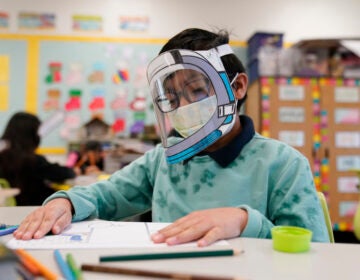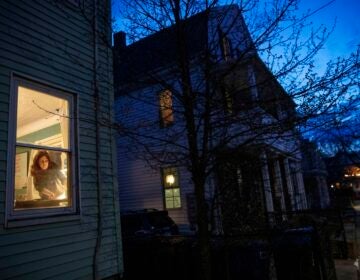‘They don’t care about us’: Nursing home staff fight for fair wage, PPE inside COVID-19 ravaged facilities
Union leaders say they have to fight for everything nursing home staff need to protect themselves from COVID-19, a virus that has been particularly deadly in nursing homes.
Listen 2:12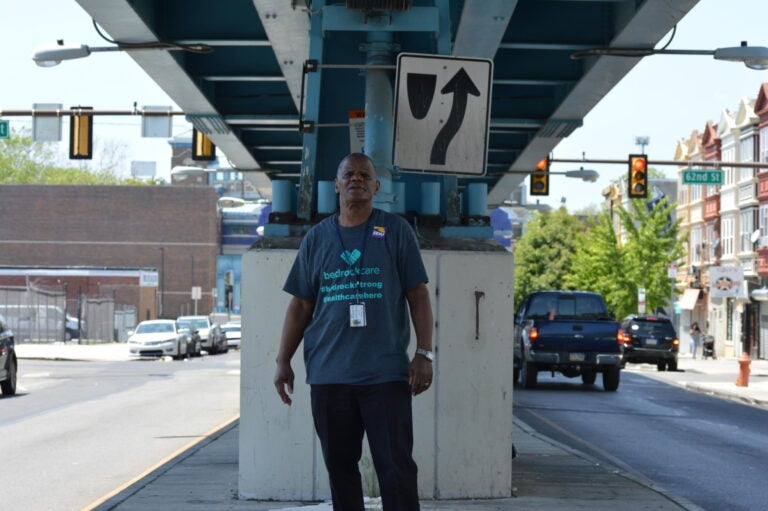
Stanley Dawson, a dietary aid at a local nursing home is also a union representative with SEIU Pennsylvania. Dawson has been fighting for hazard pay and personal protective equipment for service workers like him at his facility since COVID-19 began. (Photo by Kerith Gabriel)
This article originally appeared on Philadelphia Weekly.
—
Stanley Dawson, 67, has been working as a dietary aid at a West Philadelphia nursing home for 16 years. He is dedicated to his job, feeding close to 400 residents when his facility is full.
“I’ve grown real close to my residents, and I like to make sure that they eat real well,” Dawson said. “And that’s my job. That’s my thing I do every day. I make sure that they get a well-balanced meal every day, every single day, because that’s what I enjoy doing.”
Dawson is also the union leader for his chapter of the Service Employees International Union (SEIU). He said he has had to fight for everything he and his co-workers need to protect themselves since COVID-19 struck, a virus that has either hospitalized or worse, killed close to 110 residents from his facility.
“Each day that I go to work, I don’t know if I’m going to contract it [the virus],” Dawson said. “I don’t know if I’m going to come in contact with it. I don’t feel good about it. But I love the work that I do, and I know I need it now more than ever. And I know that if I don’t do it, you know, who’s going to take care of these residents?”
But for Dawson and other nursing home workers like him, staying dedicated to their jobs since the pandemic hit has proven to be a strain.
Matthew Yarnell, president of SEIU Healthcare Pennsylvania, said union leadership has been pushing for a variety of improvements to support workers as the pandemic has surged. SEIU represents 45,000 health-care workers across the Commonwealth.
The union has been able to achieve hazard pay, ranging from an extra $2 to $5 an hour, at only 33 of the 109 nursing homes it represents, Yarnell said. The SEIU has also been actively advocating for robust health care for workers, to guarantee that if they contract the virus, they will be covered.
In addition, a severe shortage of the proper personal protective equipment (PPE) spurred the union to find ways to source it from the outside and get it to workers. And for workers who are experiencing stress, anxiety and/or depression due to their jobs and possibly due to mass deaths in their facilities, SEIU has been trying to help them access mental health services, Yarnell said.
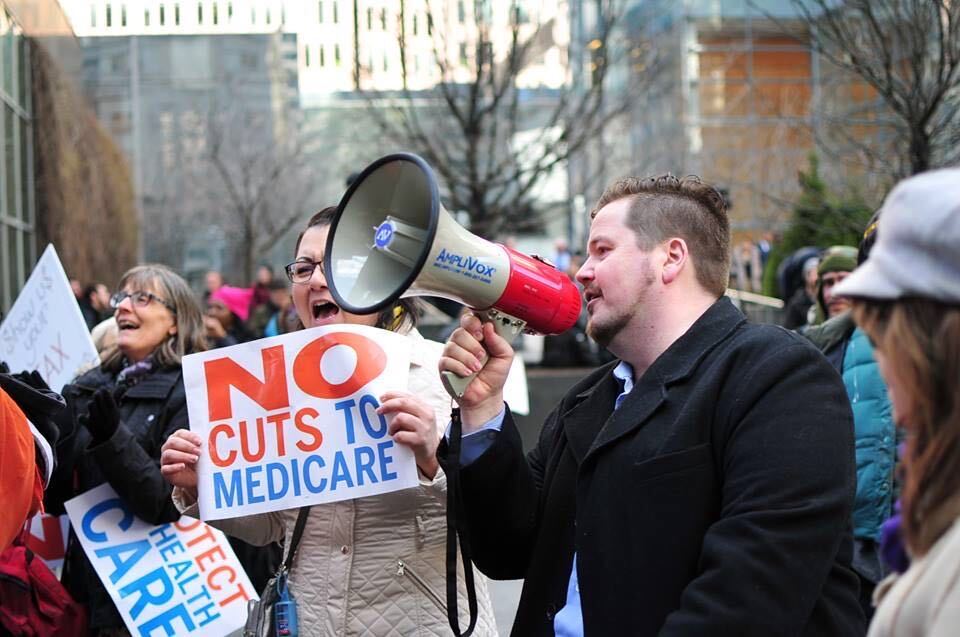
“I think health-care workers are incredible people, and you don’t go into doing this work without having a love and passion for caring for others,” Yarnell said. “And so oftentimes, people put their needs aside and focus on the folks who are caring for. But I think it’s been really challenging and stressful for folks. And look, these are all jobs that are oftentimes low-wage.
“And we don’t think that’s an accident either,” Yarnell continued. “When you look at caregiving, and you look at the demographics of the workforce, largely it’s women – largely women of color.”
As part of the advocacy SEIU is doing on behalf of its workers, “We’re talking to every single person we can in any kind of leadership position about how we make folks understand what the actual reality on the ground for workers is, and B, how do we never get here again” in terms of a shortage of PPE, for instance,” Yarnell said.
Workers at Dawson’s facility only received the proper PPE, such as N-95 masks, gowns and gloves, about three weeks ago. And that was through a donation.
Dawson, who earns $14.43 an hour in his job as a dietary aid at Care Pavilion Nursing and Rehabilitation Center in West Philadelphia, said his crew does receive some hazard pay but that he had to fight the management hard to get it. Workers at other nursing homes say they also lacked the proper PPE for weeks and that they are not getting any hazard pay, despite the high risks they are taking every day at their jobs.
Care Pavilion, which is managed by the Bedrock Care Group did not immediately respond to a request for comment in time for this report.
That is true for a North Philadelphia housekeeper at another nursing home in Bryn Mawr, who wants to remain anonymous because she has chronic obstructive pulmonary disease (COPD), a chronic inflammatory lung disease that causes obstructed airflow.
Out on a temporary medical leave because she was having trouble breathing behind the N-95 mask, this housekeeper, 60, said she is trying to retire for medical reasons with her full benefits. She doesn’t want to risk going on the record with her name because of her fear of retribution from her employer.
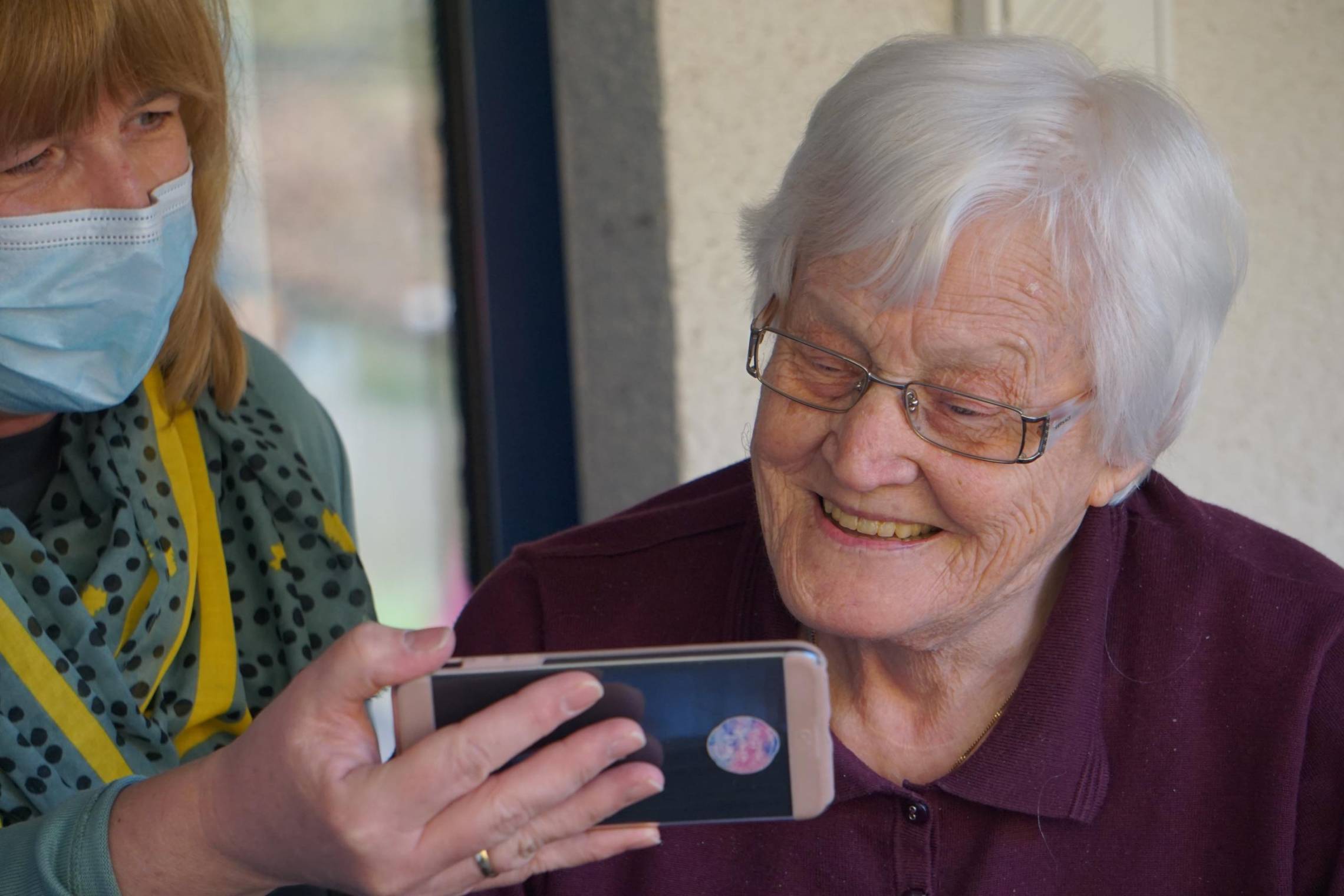
Earning just a little over $13 an hour for cleaning and disinfecting rooms, the housekeeper said she and the other employees at her facility do not earn hazard pay – despite the high risks they are taking being around a vulnerable population during the pandemic.
For instance, she said that she had cleaned several rooms before she learned that residents in those rooms had tested positive for COVID-19.
“They told me too late, and I got mad about it,” she said. “Why you all telling me now? I been in them rooms!”
This was before she and other employees had the proper PPE, the housekeeper said. Then the union came in with the PPE and instructed her and every other employee to treat each room as if it could be infected.
So the housekeeper is wearing her gown, gloves, booties, and N-95 mask – and using bleach even though the fumes are bad for her – even though she is “suffocating” under the mask.
“You tell me I gotta wear that mask, I probably will fall out by then,” the housekeeper said. “It’s 80-something degrees out there, and they don’t give us no air [conditioning]. They got partial air. I probably got to go all the way down the halls just to get some air.
“So I called my doctor yesterday, and she gave me a letter,” the housekeeper said. “I’m staying out for a week for now [on medical leave]. “I want to come out [retire]. I can’t take this.”
To retire with her benefits for medical reasons, she needs her doctor to fill out the proper paperwork. The housekeeper believes she will qualify. Nonetheless, she is scared. She is getting tested for the COVID-19 this week. The housekeeper said one floor of the facility is now designated just for COVID-positive patients, but that it took the management several weeks to get that organized, and sick individuals were spread throughout the building.
“I would have stayed, but I don’t have [any] choice,” the housekeeper said. “That shouldn’t stop me from getting what I’ve earned.
“They don’t even look at us [as] important,” she added. “We just there. They don’t honor us…We workin’ our asses off, and they won’t give us a raise…If it wasn’t for us, that place wouldn’t be. That’s a fact. And clean.”
A cook at another nursing home, Julie D., who only wanted to use her first name and last initial, also for fear of retribution from her employer, is a single mom. She had to give up working on weekdays because she had no one to watch her two young children once the schools closed due to the pandemic.
Now she is working weekends, sometimes a double shift. But she has lost at least 40 hours of work every two-week pay period, making it hard for her to pay her bills, Julie said.
“We really feel like that is so critical – that not only is it critical to figure out how to lift wages in the sector of work at this moment, but also to figure out how we make sure we keep it going forward,” Yarnell said. “We know because of the economic shutdowns that there’s going to be huge challenges to state budgets. And we know that depending on who’s in charge, it’s going to be the conversation.”
Julie said that as union leader for her building, she had to fight hard for hazard pay. She now makes an extra $2.50 an hour, bringing her pay up to $26.80 an hour. Julie has worked at the nursing home for 13 years.
“We had to argue about it, and she [the administrator] didn’t want to give it to anyone,” Julie said. “We had to be like, ‘These people are risking their lives coming to work helping these people out.’ So they finally came up with an agreement the nurses and CNAs [certified nursing assistants] get an extra $5 and hour, and the housekeepers and dietary workers an extra $2.50 an hour.”
This was after the entire second floor became a virus ward, housing approximately 28 people who are COVID-positive. More than 10 residents in the Montgomery County nursing home have died from coronavirus, said Julie, who commutes to work from Philadelphia.
“We’ve had at least eight or nine staff members that have gotten sick, and they’re like, ‘Well, I don’t know if I want to come back because the virus is still in the building,’ and they’re scared,” Julie said, adding that, like at Dawson’s facility, the union had to fight for the proper PPE for its workers.
“As far as masks and gloves and stuff, the administrator was just holding onto everything in her office,” Julie said. “She wasn’t giving anyone anything, so it took some time for that. It just recently started getting better. We had to make several complaints. I had to email the owner personally, because at the end of the day she [the administrator] was making like everything was OK in the building.”
The only way workers found out there was a COVID-positive resident in the facility was because a family member called, Julie said.
While she used to help serve trays of food on the different floors in the building, Julie said she is now staying only in the kitchen doing her work. She also said that the facility is now finally using disposable products, so they no longer have to deal with disinfecting plates, cups, and silverware.
When she returns home, she strips down on her enclosed porch and immediately takes a shower before taking care of her children, Julie said.
“It’s a lot to deal with, but we love our jobs,” Julie said. “It’s why we still get up and do what we do, and they [the administration] should appreciate that, because people are getting sick helping the helpless.”
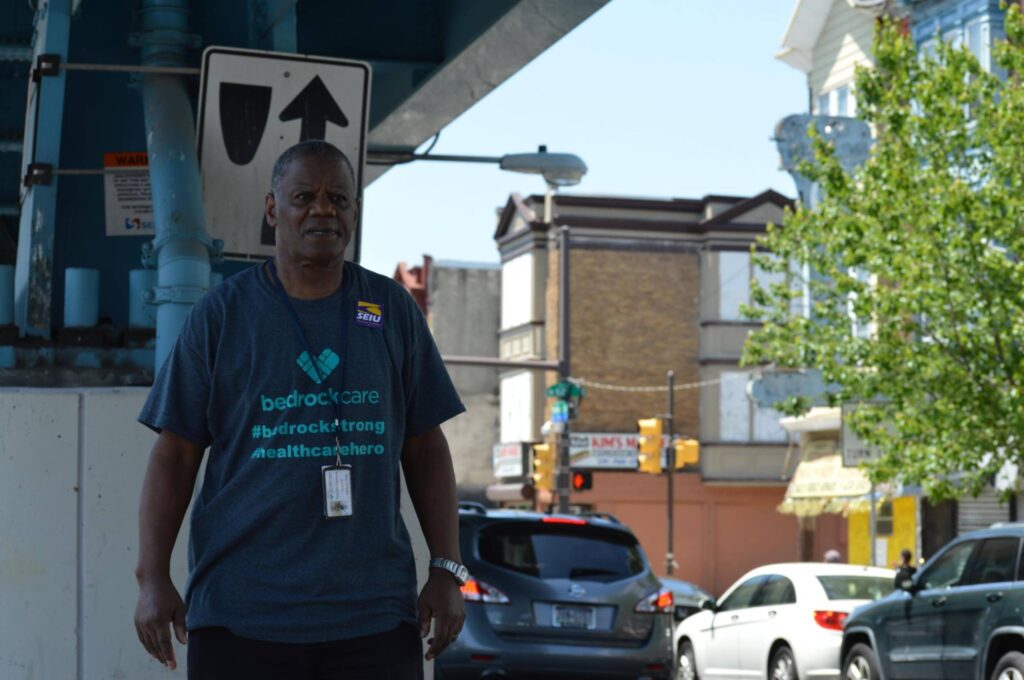
‘This is not an easy job’
Stanley Dawson knows just what these women are referring to because it’s also his life five, sometimes six days a week.
“They need to know that this is not an easy job,” said Dawson, who is also the union representative at his nursing home facility. “They need to know that every day my life and my co-workers’ lives are on the line. We’ve had people [break] down emotionally, and we needed folks to come in and speak to us on a psychological level, where some folks were losing their minds. You know they are not thinking the same way they normally would think. We needed counseling. We needed somebody to come in, and we finally got that [but] I had to fight for it.”
SEIU has contracted with Highmark to make mental health treatment available online to workers and has created a pilot program to support people who are working in environments where there have been mass death, Yarnell said.
As the union representative, Dawson also had to fight for the proper PPE for the workers in his facility.
“They got a floor with nothing but coronavirus victims on it,” Dawson said. “That floor is so contagious, you have to go in with full gear from head to toe. We didn’t have that at first. We [were] going in with just a face mask, gloves, a gown. We didn’t have no protective shield or nothing across our face to protect us in case droplets were in the air.”
Yarnell said the union has sourced PPE from other organizations, including a significant donation from Pennsylvania Health and Wellness, which provides Medicaid and insurance plans in the Commonwealth. But ultimately, “it’s really the employer’s responsibility to provide” the PPE, which largely isn’t happening. And if there is another surge of the virus, the union could find itself right back in a shortage situation, Yarnell said.
“We’ve been really calling on Congress to push the president to use his authority and really work with manufacturers in this country to begin to manufacture what we need to keep people safe,” Yarnell added.
Dawson said that despite the new PPE, the counseling, and the little bit of hazard pay that workers now receive, everything has been a battle – and that the $14.43 he earns is not a livable wage for him, his wife, and his son.
“Oh, heck, no. No, no, no,” Dawson emphasized. “We’ve been fighting to get more money for this stuff. We’ve been fighting and fighting and fighting. And we’re going to continue to fight until they give us what we need and what we deserve.”
Nonetheless, he loves his job and will continue doing it, Dawson said.
Has he thought about quitting?
“I would be honest, I would have to say yes, I thought about that,” Dawson said. “But every time I think about that, I always look at that old lady on Three West that’s always looking for me. She always sat right there and [doesn’t] talk to nobody but me.
“I’ve got to keep going. I’ve got to keep doing this job. These folks need me.”
 This story is a part of the Philadelphia Weekly Behind the Frontlines series, which aims to look at the lives of other essential workers forgotten in the midst of the COVID-19 pandemic. Behind the Frontlines is delivered in partnership with WHYY and Broke in Philly, a collaborative reporting project among 23 news organizations, focused on Philadelphia’s push towards economic justice. Read more of our reporting at brokeinphilly.org.
This story is a part of the Philadelphia Weekly Behind the Frontlines series, which aims to look at the lives of other essential workers forgotten in the midst of the COVID-19 pandemic. Behind the Frontlines is delivered in partnership with WHYY and Broke in Philly, a collaborative reporting project among 23 news organizations, focused on Philadelphia’s push towards economic justice. Read more of our reporting at brokeinphilly.org.

Get daily updates from WHYY News!
WHYY is your source for fact-based, in-depth journalism and information. As a nonprofit organization, we rely on financial support from readers like you. Please give today.


![CoronavirusPandemic_1024x512[1]](https://whyy.org/wp-content/uploads/2020/03/CoronavirusPandemic_1024x5121-300x150.jpg)

